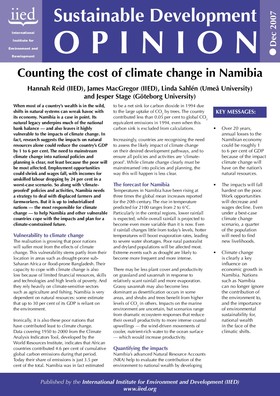Counting the cost of climate change in Namibia

When most of a country’s wealth is in the wild, shifts in natural systems can wreak havoc with its economy. Namibia is a case in point. Its natural legacy underpins much of the national bank balance — and also leaves it highly vulnerable to the impacts of climate change. In fact, research suggests the impacts on natural resources alone could reduce the country’s GDP by 1 to 6 per cent. The need to mainstream climate change into national policies and planning is clear, not least because the poor will be most affected. Employment opportunities could shrink and wages fall, with incomes for unskilled labour dropping by 24 per cent in a worst-case scenario. So along with ‘climate-proofed’ policies and activities, Namibia needs a strategy to deal with displaced farmers and farmworkers. But it is up to industrialised nations — the most responsible for climate change — to help Namibia and other vulnerable countries cope with the impacts and plan for a climate-constrained future.
Cite this publication
Available at https://www.iied.org/17026iied